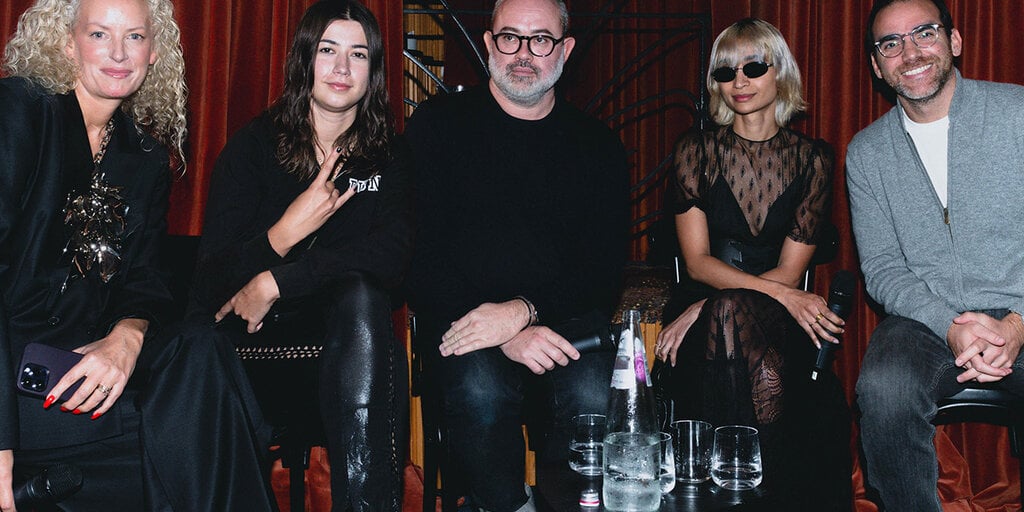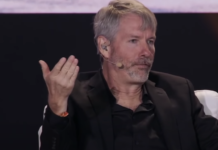
The second Future Fashion Summit took place in Paris last week. The curated events series from Holly Wood Labs aims to connect luxury fashion houses with digital brands and platforms through debate and stimulating conversation.
It played out over two panels, plus a fireside chat between myself and The Sandbox co-founder Sébastien Borget. The day’s broader theme was reconciling digital and physical craftsmanship—how the two metiers can exist concurrently, each adding value to the other.
The panels variously explored technology as a means to democratize fashion and enhance experience, alongside being a tool for customer relationship management. Also discussed was the shift from mobile devices to wearables.
Dior Innovation Manager Shreya Tyagi, who spearheaded the Maison’s recent B33 connected sneaker launch, made the case for augmented reality. She cited Dior’s Prefall 2023 show, which took place in Mumbai in March alongside an AR experience that recreated some of the patterns seen on the runway.
She noted that digital collectibles can offer “an opportunity to close the loop with top-tier clients with a ‘see now, buy now’ experience, where they can scan a look to buy a collectible,” engaging them while their physical purchase is being crafted.
Lucien Pages, founder of the eponymous public relations agency behind last month’s Coperni show where the Humane AI Pin premiered, agrees.
“For me, tech is a tool to make the physical fashion show experience stronger,” he said, adding that it “also engages those who can’t participate, creating that bridge between inside and out.”
According to Geoffrey Perez, global head of luxury at Snapchat maker Snap, “There’s definitely a shift happening from mobile devices to wearables. With the big companies—Meta, Google and the like—the priority is glasses: VR, AR or mixed reality.” Snap’s particular focus is AR, he said, as the company “sees this as a very human way of accessing technology.”
Snap, which is powering the current “Egypt Augmented” AR activation at The Louvre, created a lens for Dior’s B33 connected sneakers, having already partnered with the house in 2020 on an AR try-on for its sellout B27 kicks. “It helped people see those products in real life at home during Covid,” he said.
Panelists were, however, also cognizant of the challenges encountered by developing technologies. “I think Cher’s ‘Clueless’ closet is still the holy grail, but we’re not quite there yet,” said Tyagi, referring to the computer-driven outfit selector from the 1995 film.
From Dior parent company LVMH’s perspective, digital fashion “has to be at the same level of excellence as the physical garments,” said Tyagi. “While we’re perfectly capable of creating a beautiful piece in Clo software, right now it doesn’t look so good when you transpose it into a 2D environment.”
The Sandbox fireside chat explored the benefits of brands creating experiences within the blockchain-based gaming universe. “It’s its own ecosystem,” observed Borget. “It combines so many different areas from fashion and beauty to sport, culture, and music.”
He pointed to its global reach of 5 million total users—an audience that’s “highly engaged and familiar with Web3.” Given that the average playtime per user is six hours, he added, partner brands like Gucci have ample opportunity to convey their message.
Comparing it to traditional social media platforms, he contended that it’s a cost-efficient marketing tool when you measure spend against reach, adding that the blockchain element means that brands can re-engage fans via the digital assets players can purchase, offering loyalty rewards and event access.
“Brands can keep building those relationships over time,” he said.
Thanks in part to the appointment of new Chief Content Officer Nicola Sebastiani—whose prior experience at companies from Ubisoft to Apple had a major focus on mobile—Borget said that The Sandbox will launch a mobile-enabled version of the platform next year, “so people can access it from anywhere.”
A physical anchor for the summit came via its creative direction, which was led by 300-year-old physical brand Kosta Boda featuring a showcase of colorful crystal tableware by Hanna Hansdotter. Attendees were also gifted near field communication (NFC) chipped products from Web3 beauty brand KIKI World.








